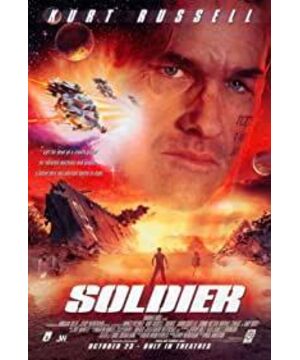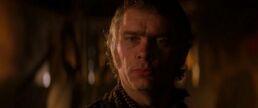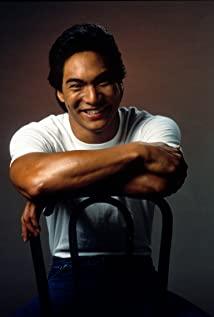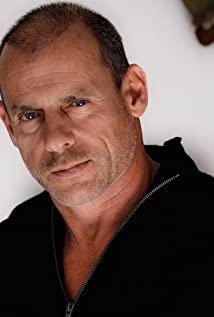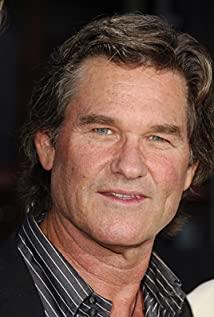The charm of "Soldier" is not only due to his reticence, but mainly from its consistent behavioral logic.
The protagonist Ted is a "professional soldier" who has been genetically screened and trained and grown up as a war machine. Obeying orders is the highest criterion for soldiers. The order warned them: "Soldiers cannot be soft-hearted", "soft-hearted have weaknesses", and "weakness equals death." Ted and his comrades obey these orders. At the end of the movie, Ted was able to successfully seize the spacecraft and flee the destruction with the surviving refugees on the planet. It also benefited from the military's code of conduct-a group of his subordinates followed his instructions.
During the one-and-a-half hour story, he shed tears quietly; at the end of the movie, he stiffly stretched out his sturdy arms to the child who was eager to embrace, and hugged him. This move made his subordinates feel a bit wrong, but as soldiers, they did not raise any questions. In addition, I thought that Ted was still the tough Ted at the beginning, and his changes were minimal. We like to see the transformation of some characters in the story, but we don't accept that kind of earth-shaking change easily. You can’t be cold-blooded and ruthless the moment before, be tender and affectionate the next moment, murderous in the first moment, be fragile and soft-hearted the next moment, be reticent in the first moment, and communicate without hindrance the next moment... If your protagonist is at first A stone, unless you are shooting "Journey to the West", otherwise the stone may be weather-beaten and dripping through the stone, but the stone has to be a stone, and it has to be hard to the end.
Ted experienced two "abandonments" in the movie, once by his army "family", and was eliminated after failing in a duel with a new generation of genetically modified soldiers ( the challenge of recruits to veterans is like a genetic determinism and environmental decision The "declaration of war" on the theory , and in the movie, the latter finally won the final victory and declared the bankruptcy of genetic determinism). For the second time by the colonists who had accepted him (these people themselves were abandoned people on the garbage planet in the larger empire, even if they were just out of empathy, they should be more likely to accept the same Abandoned Ted, but ultimately chose to ban him out of fear of violence), this time he left tears-after leaving the colonial group, he still did not expose his weaknesses when there was no one. , Because weakness equals death.
In the first half of the movie, except for the quick and smooth opening of the ad campaign, and the vigorous battle between the old and the new, Ted sat in silence for most of the time (in the barracks or in the colony). . His "action drama" on Junk Planet includes: a "tug-of-war" with a sandstorm, cut his finger while cutting a radish with a knife, and vent his fear and anger at a iron leather sandbag. The most ambiguous and hazy scenes in this part are all from the gentle and beautiful Connie Nelson (she played Diana's loving mother in the movie "Wonder Woman"), and the look in Ted's eyes is more than any sexy and provocative nude. The man suffocated, but the movie did not let him take any further action-this naturally avoided the ethical problems that may appear in the play, and in a sense, it also saved the soldier's boyhood, that is, his hard image. It’s hard to imagine how Kurt Russell would continue to play a tough guy on the screen with the "facial paralysis" after experiencing some lingering rains. This is something that only James Bond and other talented people can keep. King Kong is not bad—Connie asked him how he felt. He said he could only feel fear. Connie hugged him pityingly. He didn't cry, he was just trembling with fear.
Ted teaches Connie's child to catch snakes, and the child saves his parents. This incident made Sean Patvi realize that the exiled soldier was a wrong decision, and he set off to find him back. From here, the action scenes in the second half of the film began to intervene, and thus interrupted the growth and transformation of the soldiers that had quietly occurred.
The movie "Soldier" is not about an inevitable war, competition or the like. The empire’s patrols were just routine. They didn’t expect there would be traces of living creatures on the junk planet; Ted didn’t need a one-to-many victory to grow into a stronger soldier. He has always been "the best of them." "(However, it is indeed the screenwriter's intention to confront the old enemy among the recruits again. It is inevitable, with a sense of shame). Ted does not need to fight for growth and enlightenment. Rather, the battle in the movie "hindered" his transformation, and his counterattack was a way to clear this obstacle so that he could finally free his hands to pick up the child alone-like a rock rolling. stand up.
View more about Soldier reviews


